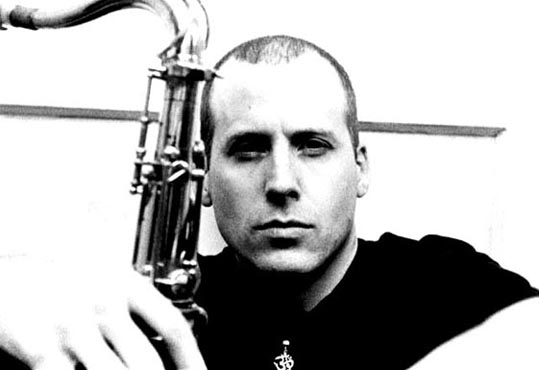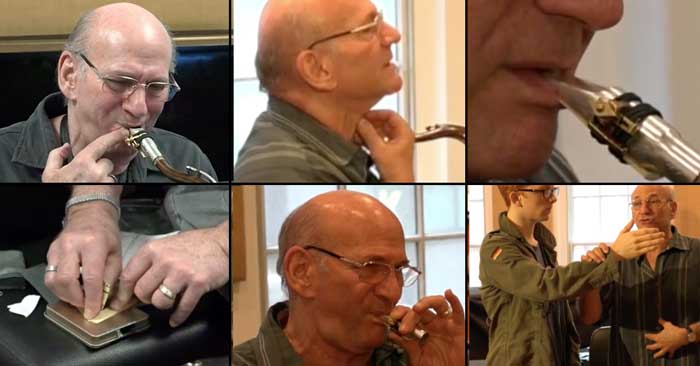Katisse Buckingham on Odd Time Signatures, Proper Warmups…and Anchorman
 Taking on the tenor, alto & soprano saxophones, flute, alto flute & ethnic flutes as well as spoken word, Katisse Buckingham is one of Los Angeles’ most seasoned and versatile musicians.
Taking on the tenor, alto & soprano saxophones, flute, alto flute & ethnic flutes as well as spoken word, Katisse Buckingham is one of Los Angeles’ most seasoned and versatile musicians.
Not surprisingly to anyone who’s heard him play, Katisse’s musical resume includes associations with names such as The Yellowjackets, Prince, Dr. Dre, Airto & Flora Purim, Dave Douglas, Pete Yorn, Terri Lyne Carrington, Herbie Hancock, Brian Auger, and so many others that it would make your head spin where I to attempt to include them all.
And oh yeah – remember Will Farrell’s classic “jazz flute” scene in the move Anchorman? Yep- Katisse as well.
Backing up a bit into his beginnings as a musically gifted youngster, Katisse received an NEA Jazz Fellowship Grant to study with woodwind master, Bill Green, attended the National Music Camp at Interlochen Michigan, and won the L.A. Jazz Society’s New Talent Award.
Fast-forward to today and you’ll find Katisse recording with his own star-studded self-titled group. His latest album is entitled Lyrical Worker and is now available for your purchasing and downloading pleasure.
The Interview
Doron Orenstein: What was it that inspired you to make music your life?
Katisee Buckinghom: My parents are both singer/songwriters. My mom in particular was a big inspiration; I grew up hanging around her band rehearsals. I started playing alto at age 12 and, while I was primarily an actor as a youth (I was a theatre major at the Los Angeles County High School for the Arts), I was always drawn to music. It took me until the end of high school to figure out that I was done with acting and wanted to go to music school. I didn’t start playing the flute until I was almost 18 and I didn’t know what a ii-V-I was until I got to music college. Kind of a late starter you might say.
DO: What do you find yourself practicing the most these days?
KB: Mainly patterns in 12 keys. Back to me being a late starter: it was only within the last decade that I learned the importance of proper warm-ups. My daily flute warm up (before I’m actually really practicing) is 45 minutes long. Sax warm up is about 20 minutes. I also learned the importance of taking little breaks between warm-ups/practicing.
I work on learning tunes (standards, other’s tunes, and my own tunes). I’m always working with a tuner and metronome and I’ll frequently work with the metronome set to speeds between 15 (bpm) and 25- even if what i’m playing is fast.
I also practice my drum kit- but only playing odd meters. For instance- I’ll put on a click between 95 and 115 and I’ll work out some grooves in 5/4, then 7/4 (most likely swing) just to warm up. Then i’ll play 9/8, 11/8, 13/8, 15/8, and 17/8- all of these grooves require four cycles (i.e- four bars of 13/8) before the click comes back to one. In other words- the bar will displace 4 times before lining up with the “1/2 note” click. I’ve found that this helps me to internalize the time signatures so when I’m actually blowing on them, it feels natural.
DO: What have you been listening to lately?
KB: I like David Gilmore’s Unified Presence as well as Alex Sipiagin’s Returning, Prints, as Equilibrium. I also listen to a good deal of Dave Douglas and some Kurt Rosenwinkel live bootlegs.
I suppose at this point I should list a bunch a really obscure artists/albums that you’ve never heard of but that truth is- mainly I listen to Wayne, Joe Henderson, Weather Report/Zawinul Syndicate, Steps Ahead, Miles, Arvo Part, tons of classic jazz, hip hop, world music (i.e. Ivo Papasov, Farmer’s Market), latin/cuban music. Things are classic for a reason. They’re good! But i’m certainly open to listening to anything…
DO: What would you say is the skill or attribute that’s helped you the most as a musician?
KB: I think I’m flexible and adaptable. I really put a lot of care into people’s music (the first time I subbed for Bob Mintzer in The Yellowjackets I had no rehearsal at all, just a soundcheck before the gig). Be it a recording session, gig, tour, etc. It’s a honor to bring to life someone’s musical vision. I see music as energy, and I endeavor to bring positive energy into the world which means playing music that I like to play and avoiding music that I don’t like to play. Althogh I’m light years from where I want to be as a player, I feel like my style is a decent blend of modern and classic.
I like things pretty pocket. Swirly non-pocket playing is not really my thing (and good luck playing that way in 17/8). When I say pocket I certainly don’t just mean funk. Dave Douglas and Chris Potter (and Cannonball!) are all super pocket. And even if they are playing something more “floaty” you can still hear the strong sense of rhythmic direction and when they want to drop back into the groove they’ll knock your head off. I think the moments in music that have made the biggest impression on me are moments of absolute groove and pocket– Miles on “Milestones”, Elvin on Trane’s “Song of the Underground Railroad”, Philly Joe on Dexter’s “Modal Mood”, Julius Baker playing anything, James Brown on “Payback”, Rakim on just about anything. That’s just the stuff that moves me.
DO: What’s the single best piece of advice you’ve been given over the course of your playing career?
KB: I’m not sure if I was given this or I found this out on my own- as a woodwind player or “doubler” play the instruments that you LIKE. I studied clarinet for years and never liked playing it.
My dear friend John Tegmeyer is also a doubler but (by far) his main instrument is the clarinet- he absolutely KILLS it. And it’s a joy to hear. You feel like you’re hearing his voice and he is in his Dharma. I would not be emoting any of that if I were to still play the clarinet. So I don’t.
I’ve also parlayed this (as I mentioned above) into styles of music and musical situations. I know some terrific players who can play with, for instance, a drummer who is rushing or dragging and they don’t seem to mind. I do.
Also- I’ve been asked to play with some very big pop artists and some of the musical situations were great (Prince, Dr. Dre, Vanessa Paradis, Pete Yorn) and some started out passible- mainly for the money- but became intolerable (Lionel Richie) for other reasons. And then quite a few I’ve turned down flat. Everyone has a different line they won’t cross (althogh for some, it’s hard to see that line). I need to feel good about what I do and I need to be able to sleep at night.
I like how Pat Metheny said that players should play music that is relevant to their peers and their generation. I think, even though they should draw from the classics, more people should do this.
DO: What’s the next musical frontier for Katisse Buckingham?
KB: About 4 years ago I finally felt like my musical concept had gelled to the point that I was ready to make my first solo record. It’s called Lyrical Worker. It’s my original music- somewhat genre-free. A stylistic mix of late Miles, Steely Dan, Tribe called Quest, Joni Mitchell, Weather Report, Don Grolnick, etc. Too many to mention. I’m still very happy with the recording. I was planning on a follow up recording a couple years later but my mother got very ill and have not been able to.
I’m happy to say that I’m going to be recording a new album of my original music in the next few months (it will feature Judith Hill- Vocal, Dennis Hamm- Keyboards, Dan Lutz- Bass, and Chris Wabich- Drums).
I am also half way thru (I have 5 tunes recorded) a record of jazz standards- which is something I thought I would NEVER do. Not because I don’t love playing standards; just the opposite. But I have so much reverence for (in addition, of course, to the original recordings/artists!) standards playing by cats like Jerry Bergonzi, Keith Jarrett, Chris Potter, etc., that I wouldn’t dare try to add anything. However I changed my mind. A few years ago I was playing with my friend’s world jazz ensemble. There was a tune in 11/8 time signature- I couldn’t solo on it to save my life. It wasn’t very hard or fast and I certainly knew the chords but nothing I played would rhythmically fit. It was really frustrating. So, as I mentioned above, I started slowly working out these time signatures on the drums (I got a drum set for this purpose).
So long story short- I’m doing a record of standards in 11/8 (tunes like Moments Notice and My Shining Hour), 13/8 (tunes like One Finger Snap, Airegin, and Chameleon, 15/8 (tunes like If I Were A Bell and Old Cowhand and Countdown), and 17/8 (tunes like Speak Low). There are certainly great players doing this (Steve Coleman!) but I think that I have a little something to add to the great catalog of standards playing- mainly because I don’t know anyone (convincingly) ripping this stuff on flute- although I’m going to be playing all my instruments. The main goal of this record is to get these so-called odd time signatures to groove and swing as much as possible.
DO: For those new to your music, which recording would you suggest they pick up?
KB: I’d say my one solo record Lyrical Worker. And I hope you’ll stay tuned for the standards in odd times record!
DO: What’s your saxophone equipment setup?
KB:
- Selmer SBA tenor (49,xxx), Otto Link Reso Chamber MPC, ligature from a C Melody sax that was made in about 1910, Rico Jazz Select #3H reed
- Selmer Mark 6 Alto (78,xxx), Jody Jazz HR 6M MPC, brass ligature, Vandoren V16 #3 reed
- Yamaha YSS-62 Soprano (11,xxx), Selmer Super Session “F” MPC, Vandoren (blue box) #2 1/2 reed
- Yamaha YFL-892 Flute
- Haynes Alto Flute





